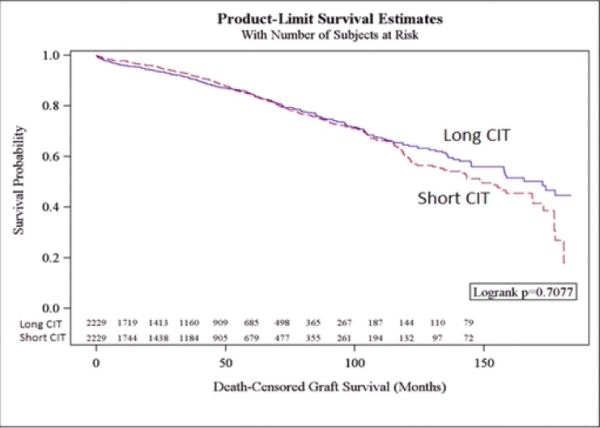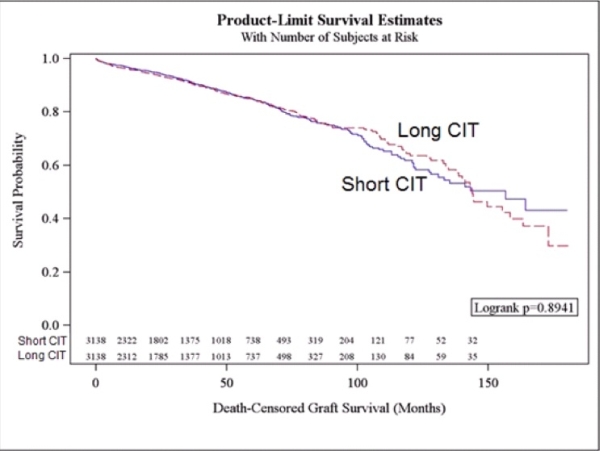Influence of Cold Ischemia Time in Combination With Donor Ischemic Events on Kidney Transplant Outcomes
Transplantation, Montefiore Medical Center, Bronx, NY.
Meeting: 2015 American Transplant Congress
Abstract number: C38
Keywords: Donors, Kidney transplantation, marginal, non-heart-beating
Session Information
Session Name: Poster Session C: ECD/DCD/high KDPI
Session Type: Poster Session
Date: Monday, May 4, 2015
Session Time: 5:30pm-6:30pm
 Presentation Time: 5:30pm-6:30pm
Presentation Time: 5:30pm-6:30pm
Location: Exhibit Hall E
Deceased-donor kidneys may be exposed to various ischemic events either from donor instability as evidenced by acute kidney injury (AKI) or donation after circulatory death (DCD). Clinicians may be reluctant to transplant kidneys subjected to ischemic events that have prolonged cold ischemia time (CIT) for fear of an additional deleterious effect.
We evaluated national data between 1998 and 2013 of adult first-time kidney-only recipients of paired deceased-donor kidneys from donors with either AKI (terminal serum creatinine ≥ 2mg/dl) or DCD in which the CIT difference between recipients was ≥1, 5, 10, and 15 hours.
Unadjusted death-censored graft survival (DCGS) between patients with delta-CITs of ≥1 in the AKI (figure 1) and DCD (figure 2) cohorts, were not significantly different between recipients with higher CIT relative to the paired donor recipients with lower CIT; nor were there significant differences at delta-CITs of ≥5, ≥10, and ≥15 hours in either cohort. On multivariate analysis of AKI kidney recipients, overall DCGS was comparable between recipients of AKI kidneys with higher CIT relative to paired donor recipients with lower CIT when the delta CIT was ≥ 1hour (aHR 0.97, 95%CI 0.84-1.13, n=4458), 5 hours (aHR 0.97, 95%CI 0.79-1.17, n=2412), 10 hours (aHR 0.79, 95%CI 0.56-1.11, n=922) or 15 hours (aHR 1.02, 95%CI 0.61-1.71, n=442). On multivariate analysis of DCD kidney recipients, overall DCGS was comparable with delta CIT of at least 1 hour (aHR 0.97, 95%CI 0.84-1.13, n=6276), 5 hours (aHR 0.97, 95%CI 0.79-1.17, n=2412), 10 hours (aHR 0.79, 95%CI 0.56-1.11, n=922) or 15 hours (aHR 1.11, 95%CI 0.64-1.92).
These results suggest that in the setting of an ischemic donor event, prolonged CIT has limited bearing on long-term outcomes.


To cite this abstract in AMA style:
Lubetzky M, Xia Y, Friedmann P, Cortes C, Kayler L. Influence of Cold Ischemia Time in Combination With Donor Ischemic Events on Kidney Transplant Outcomes [abstract]. Am J Transplant. 2015; 15 (suppl 3). https://atcmeetingabstracts.com/abstract/influence-of-cold-ischemia-time-in-combination-with-donor-ischemic-events-on-kidney-transplant-outcomes/. Accessed February 22, 2026.« Back to 2015 American Transplant Congress
